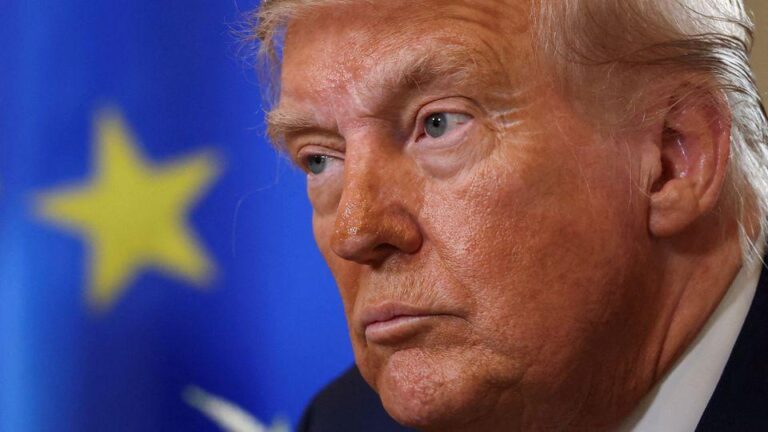Former U.S. President Donald Trump has weighed in on the United Kingdom’s recent announcement to recognize a Palestinian state, marking a significant moment in the evolving dynamics of Middle East diplomacy. The UK’s plan, unveiled amid ongoing efforts to revive peace talks, has sparked a range of responses from global leaders. Trump’s reaction, reflecting his characteristic stance on the Israeli-Palestinian conflict, adds a new layer of complexity to the international discourse surrounding the contentious issue. This article examines his comments and their potential implications for future diplomatic relations.
Donald Trump Critiques UK’s Move on Palestinian State Recognition
Former U.S. President Donald Trump has voiced strong opposition to the United Kingdom’s recent announcement to recognize a Palestinian state. In a statement released via social media, Trump criticized the move as “counterproductive” to peace efforts in the Middle East. He emphasized that unilateral recognition could undermine ongoing negotiations between Israel and Palestine and derail years of diplomatic progress facilitated by various administrations.
Trump outlined several concerns regarding the UK’s decision, highlighting the complexities of the Israeli-Palestinian conflict and the importance of a negotiated settlement. Key points raised include:
- The risk of inflaming regional tensions
- Potential negative impact on Israel’s security
- The necessity of direct dialogue over international declarations
| Aspect | Trump’s Perspective |
|---|---|
| Peace Process | Should be led by parties involved, not imposed |
| UK’s Role | Can contribute constructively without unilateral actions |
| Regional Stability | Must be prioritized over political symbolism |
Implications for US-UK Relations Amid Middle East Policy Shift
The United Kingdom’s evolving stance on Palestinian state recognition introduces a notable shift in the traditional alignment between the US and UK foreign policies in the Middle East. Historically acting as close allies with largely synchronized strategies, the UK’s recent move challenges this dynamic, prompting Washington to recalibrate its diplomatic approach. Former President Donald Trump’s critical response underscores underlying tensions as the US remains focused on maintaining strong ties with Israel while emphasizing a cautious diplomatic balance in the region.
Key factors influencing this development include:
- Diverging strategic priorities: The UK aims to enhance its influence in the Middle East by addressing Palestinian aspirations more directly, while the US continues to prioritize its security commitments.
- Potential impact on intelligence sharing: Differences over Middle East policy may test levels of cooperation and trust, which have been foundational to US-UK relations.
- Diplomatic ripple effects: Other European nations could follow the UK’s lead, further complicating US-led peacemaking efforts.
| Aspect | US Perspective | UK Perspective |
|---|---|---|
| Palestinian State Recognition | Opposes unilateral recognition | Considers formal recognition |
| Israel Relations | Strong ally, strategic partner | Seeks balanced diplomacy |
| Regional Stability | Focus on counterterrorism | Promotes political dialogue |
Expert Recommendations for Navigating Diplomatic Challenges
In the face of complex international reactions, seasoned diplomats emphasize the importance of strategic communication and multilateral engagement. When responding to contentious policy decisions such as the UK’s plan to recognize a Palestinian state, confidence in measured language can prevent escalation and foster dialogue between conflicting parties. Experts advise leaders to prioritize back-channel negotiations, which often provide the flexibility necessary to diffuse tensions without the glare of public scrutiny.
Moreover, understanding regional dynamics and aligning with key geopolitical stakeholders is vital. Analysts highlight practical steps including:
- Maintaining open lines: Continuous dialogue with both allies and opposing factions reduces misunderstandings.
- Leveraging international forums: Platforms like the UN serve as neutral grounds to facilitate compromise.
- Monitoring public sentiment: Sensitive socio-political landscapes require responsive diplomatic strategies that consider local populations’ perspectives.
| Diplomatic Strategy | Purpose |
|---|---|
| Back-Channel Talks | Discreet conflict resolution |
| Multilateral Forums | Formal negotiation platforms |
| Public Diplomacy | Influence perception |
| Stakeholder Mapping | Identify political allies/enemies |
To Conclude
As the United Kingdom moves forward with its plan to recognize a Palestinian state, reactions from key international figures like former President Donald Trump underscore the complexities this decision brings to the geopolitical landscape. Trump’s response highlights the ongoing debate surrounding Middle East policy and the delicate balance nations must navigate in addressing longstanding conflicts. The coming weeks will be critical in observing how this development influences diplomatic relations and regional dynamics.



